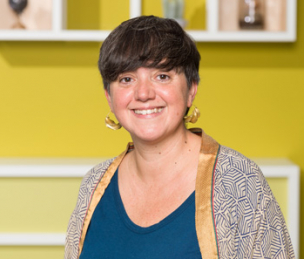Primary tabs
I am Senior Investigator at the Multimodal Language Department at the Max Planck Institute for Psycholinguistics. I work in experimental pragmatics, employing methods from psycholinguistics and cognitive science to test pragmatic theories of communication. I am interested in the interdependence between language and social cognition, including their co-development during human maturation and their co-evolution during language change—a research program I call cultural evolutionary pragmatics.
This research program investigates multimodal referential communication (including speech/sign, gaze and gesture) across languages and ages to address fundamental questions about the way human social cognition is shaped by communicative interaction; for example,
- Do different grammars pose different demands on the social cognition of different speech communities?
A Japanese speaker must monitor the spatial location of their listener when using demonstratives since their middle form ‘sore’ refers to something far from the speaker but close to the listener, while the distal form ‘are’ refers to something far from both interlocutors. By contrast, the spatial distinction between ‘this one’ and ‘that one’ in English is established from the speaker’s location.
- When those grammatical elements change over time (e.g., when demonstratives evolve into definite articles), do different generations of speakers come to automatise different socio-cognitive processes in their language use?
Nowadays, an English speaker needs to monitor what is new and familiar to their interlocutor in order to use articles appropriately (compare ‘We bought a house’ vs ‘We bought the house’), yet we do not know whether speakers of earlier varieties of English (which did not yet have articles) were less sensitive to the new-familiar distinction.
- How does social cognition develop as children acquire those grammatical elements that recruit social cognition in their language?
Whereas a child acquiring the English article system must learn to monitor what is new and familiar to their interlocutor, children learning Japanese often have to infer from the context of utterance whether something mentioned is new or familiar since Japanese does not have articles that obligatorily mark such a distinction. This suggests a potential, interesting difference in the division of pragmatic labour between speakers and listeners in different languages.
Now that the language sciences are finally in a position to take on the big-data challenges of multimodality through automated and semiautomated measurements and statistical methods (e.g., machine learning and other AI techniques), the study of cultural evolutionary pragmatics at the Multimodal Language Department will take advantage of the latest technological advances in social-interaction research. This includes annotated corpora of semi-naturalistic face-to-face interaction using dual eye-tracking, experimental studies conducted in Immersive Virtual Reality using motion- and eye-tracking methods, and computational modelling of multimodal referential communication.
- Curriculum Vitae
-
I completed a BA in Spanish Philology at the University of Oviedo (Spain), an MA in Theoretical Linguistics at the University of Reading (UK) and an MPhil in English and Applied Linguistics at the University of Cambridge, before obtaining my PhD at the University of Cambridge in 2005.
Between 2005-2011, I was a Postdoc at the Linguistics Department at UCL funded by a British Academy Fellowship and at the Psychology Department at Princeton University funded by a Marie Curie International Fellowship. Between 2011-2014, I was a named Postdoc on a Leverhulme Research Project at UCL Psychology and Language Sciences.
In 2014, I received a Young Research Talent Grant from the Research Council of Norway and was the PI of a 4-year project on cross-linguistic pragmatics at the Philosophy Department at the University of Oslo. During that time, I also received a Mobility Grant to visit the Language Lab at the Brain and Cognitive Sciences Department at MIT. This research stay was extended to 3 years when I received funding from the Research Council of Norway for another large-scale project (2018-2023) to investigate the pragmatic development of blind, sighted and newly-sighted children in India, in collaboration with the Vision Lab at MIT and Project Prakash—a Humanitarian/Scientific organisation. During that period, I was Senior Researcher at the Philosophy Department at the University of Oslo.
In June 2023, I joined the Multimodal Language Department at the Max Planck Institute for Psycholinguistics as Senior Investigator.

Share this page